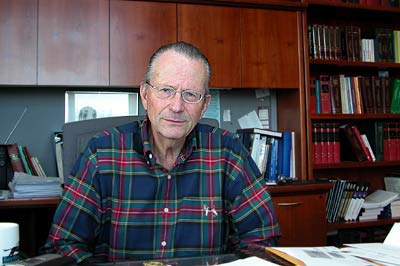UC Berkeley Web Feature
 |
UC Berkeley constitutional law professor Jesse Choper. (BAP photos) |
Berkeley experts weigh whether the Supreme Court will curtail election congressional gerrymandering - and if it should
Second of a series about Congressional redistricting: Read the introduction
Jesse Choper is the Earl Warren Professor of Public Law at UC Berkeley's Boalt Hall School of Law, whose faculty he joined in 1965. After graduating from law school, he clerked for Chief Justice Earl Warren of the U.S. Supreme Court, then taught at the Wharton School of the University of Pennsylvania from 1957 to 1960, and at the University of Minnesota Law School from 1961 to 1965. A former dean of Boalt Hall (1982 to 1992), Choper is a widely recognized constitutional law scholar. His "Constitutional Law" casebooks are in their ninth edition, his "Corporations" casebook in its fifth, and "The Supreme Court and Its Justices" in its second.
Powell: Why did the Supreme Court decide to take the Pennsylvania case, 17 years after it last agreed to consider gerrymandering?
Choper: To understand that, you need a little bit of historical perspective. For a number of years prior to 1960, there had been challenges to what is called "malapportionment," which means there were some congressional districts in which 10,000 voters elected a representative, and other districts in which it took 200,000 voters. In virtually every state in the country, state-legislature districts and congressional districts, you could find malapportionment. The Federal courts, including the Supreme Court, had rejected those claims on the ground that they were nonjusticiable - meaning none of the court's business. The general attitude was there was nothing in the Constitution that forbade this.
But in the early 1960s, the Court held that it could indeed decide these cases. Chief Justice Earl Warren said that this was the biggest decision that his Court had made, bigger even than Brown v. Board of Education [dealing with school segregation], because of the enormous impact it had. A couple of years later, in 1964, the "one man, one vote," ruling took place that ensured that all legislative and congressional districts in a state would have an equal number of voters.
One of the criticisms about the decision was that correcting malapportionment, or population disparities, is best described as one blade of a set of scissors. It was meaningless by itself. Why? Because gerrymandering was still available. There are mathematical ways to set up "one-man, one-vote districts" but use packing and cracking to give one party disproportionate representation.
So the decision in the 1960s had nothing to do with race or political districting?
It had nothing to do with anything except population equality. As for race, denying people the vote on the basis of their race has always been barred as a violation of the 15th Amendment. And a series of decisions in the 1970s and 1980s said that if you gerrymandered to diminish minority representation, that was a clear violation of the 15th Amendment. That was easy. However, the famous case that reached the Supreme Court in 1986, Davis v. Bandemer, said that political gerrymandering can also be so - and this is my word - "outrageous" that it would be held to violate the Constitution. But the court, in a fragmented series of opinions, ended up with something that wasn't all too clear about what constituted outrageous.
You mean the definition that said one political party had to be "essentially shut out of the process"?
Yes - the question is what the devil does "shut out" mean? Altering the situation for one election wasn't enough, they said; the party had to have been shut out over a series of elections. It's a very ambiguous standard, and the consequence has been - and this is the key - that now, 17 years later, there has not been a single final decision on any federal circuit court in the country that has held that a state legislature has unconstitutionally engaged in a political gerrymander.
 'Gerrymandering tends to balance out over the years anyway. One year it's the Republicans screwing the Democrats and the very same year, in another state, it's the opposite.' -Jesse Choper, UC Berkeley law professor |
But one recent one did not, and that's where these lines come together. They said the dominant consideration for this districting was political. The Democrats had tried to take care of themselves by creating districts with lots of blacks, who tend to vote Democratic. The Court said that because this wasn't done simply because the voters were black, but had more to do with politics, it did not violate the Equal Protection guarantee.
So, it was all right that politics were the primary factor in a redistricting that also considered race?
That's exactly it. The Supreme Court upheld this type of gerrymandering. And no one in that case said hey, that's no good either. So today we have a very ambiguous situation about what you can and can't do.
Do you think that the Supreme Court's motivation has anything to do with the fact that Republicans have set a new precedent by redistricting in Texas in 2002, only two years after the census?
Maybe. I don't think you can read the crystal ball. Let me put it this way: I think most Court watchers were surprised they took this case. I sure was. In Bandemer they set the standard deliberately high, I've looked at the case pretty carefully, and there's certainly no indication that the Democrats have been shut out in any blatant way. That's one of the arguments for saying that political gerrymandering takes care of itself. To the extent that these are Congressional seats, it evens out. Voters change, they move around, they don't vote party lines as much anymore. You can try to stack it up, but things tend to balance out over the years anyway. One year it's the Republicans screwing the Democrats and the very same year, in another state, it's the opposite.
But regardless of whether it balances out numbers-wise, doesn't the fact that close to 400 of the 435 House members don't have to face competitive elections mean that they can afford to be more partisan and less conciliatory?
That's an old story. Do you know that it was said back in the 1950s and 1960s that there was greater turnover in the Dumas of the Soviet Union than there was in the House of Representatives? Although it does strike me that both sides have become more aggressive in Congress, yes. Look at what the Democrats are doing to the nomination of judges.
In the current case, Pennsylvania Democrats are arguing that it is "unconstitutional to give a state's million Republicans control over ten seats while leaving a million Democrats with control over five." Is it unconstitutional or merely unfair?
That is the issue that will dictate the outcome of the case: Can the Court refine its 1986 standard determining whether a political gerrymander is unconstitutional and decide whether it has been met in this case? I doubt that they'll significantly change what the standard is. They may well send it back to the lower court and say, "You've used the wrong standard. We agree that we didn't give you much to work with, so now we'll give you some more."
There's another potential outcome. They might get five votes for the proposition that they made a mistake in 1986. Two justices of the current court, William Rehnquist and Sandra Day O'Connor, took the position in 1986 that the court had no business in this area - that gerrymandering should be a political question, which simply means that anything goes. One argument in support of that is that there hasn't been a violation since 1986. And it's possible that they'll get five votes for that proposition. Justice O'Connor is normally the swing vote, she was a member of a state legislature, so she's pretty savvy about redistricting.
What's the most surprising outcome you can imagine in this case?
It would surprise me and a lot of other people if the Court adopted the same standard for political gerrymandering that they have for racial gerrymandering. That would be a big shift in what's going on. It is hard to cover up a political gerrymander in the way that people have covered up or justified racial gerrymanders. This is something that goes on in practically every state in the country.
Except Iowa, which appoints a neutral third party to do the redistricting.
Yes. And let me say, it is not hard to ignore politics in the redistricting process, what with the computer software they use, but that would be a drastic change in the process. I don't think that as a policy issue I would be against that. What would be the harm?
So despite the fact that gerrymandering has been around since the Revolution, you do think it harms the electoral process?
Well, I myself think that it's wrong, but it may not be harmful. I think that the extreme politicization that has existed for this country for so long is unfortunate. I am no fan of the legislative process or the way legislators act any place that I know of, not Congress, the California Legislature, the governors' chairs and the President's office. I think the public interest is trumped very often, not by politics but more precisely by the desire to get reelected. That's what counts. Serving the public interest doesn't count, not when it interferes with your capacity to get reelected. And that's why I support people in politics who I perceive to be principled, seeking to serve the public interest as they see it, and willing to risk political careers to do so - regardless of their party. Classical politicians say you can't accomplish anything if you can't get reelected, but I don't fully agree with that.
More information

